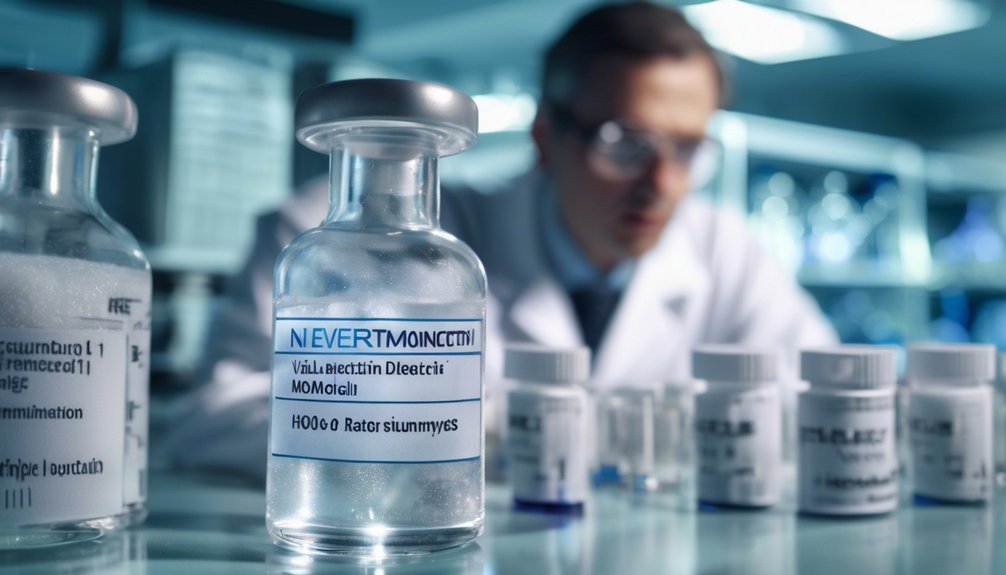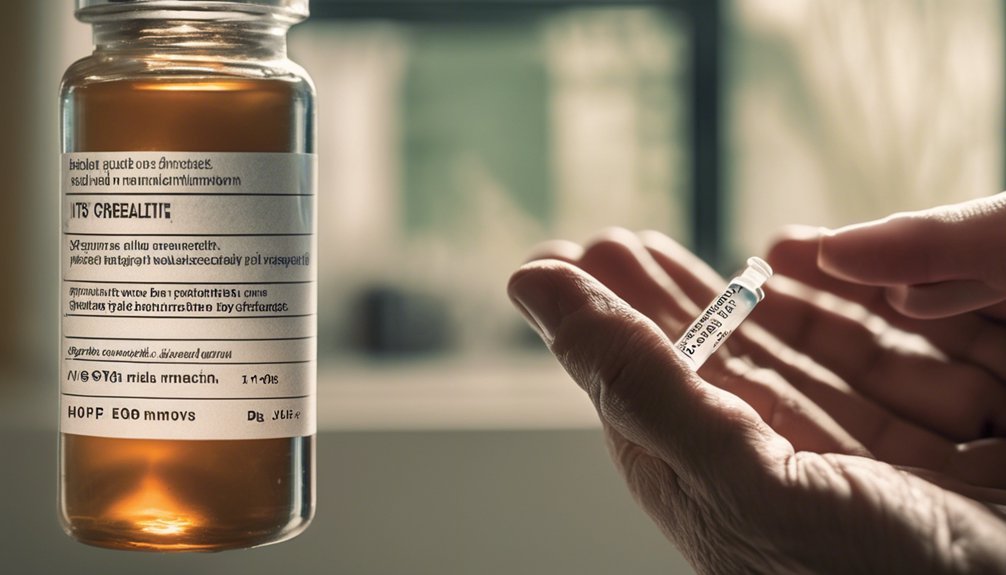Ivermectin, primarily known as an anti-parasitic medication, is now being investigated for its potential role in enhancing immunotherapy effectiveness for triple-negative breast cancer (TNBC). Research suggests it may increase T-cell activity and sensitize cancer cells to chemotherapy. However, the complexities of its mechanism and the variability in patient responses raise critical questions. What specific pathways does ivermectin target, and how can it be optimally integrated into existing treatment protocols?
Key Takeaways
- Ivermectin may enhance the efficacy of immunotherapy in TNBC by boosting immune responses and increasing T-cell activity against tumors.
- Combining ivermectin with chemotherapy can improve cancer cell sensitivity, potentially leading to better treatment outcomes for TNBC patients.
- Ongoing clinical trials are assessing the safety and effectiveness of ivermectin as an adjuvant therapy in TNBC treatment protocols.
- Patient selection for ivermectin therapy should consider genetic markers, overall health, and prior treatment responses to optimize outcomes.
- Research is needed to establish effective dosing regimens and identify biomarkers that predict responses to ivermectin in TNBC patients.
Understanding Triple-Negative Breast Cancer

Triple-negative breast cancer (TNBC) represents a particularly aggressive subtype of breast cancer characterized by the absence of estrogen receptors, progesterone receptors, and human epidermal growth factor receptor 2 (HER2).
Understanding the triple negative characteristics of this cancer is crucial for effective patient care. TNBC tends to grow and spread more quickly than other breast cancer types, leading to significant treatment challenges.
Understanding the aggressive nature of triple-negative breast cancer is essential for navigating treatment challenges effectively.
Standard therapies, such as hormone therapy and targeted treatments, aren’t effective due to these receptor deficiencies. Consequently, you might explore alternative strategies, including chemotherapy and emerging clinical trials.
Recognizing these complexities allows you to better support patients and navigate their treatment journeys, emphasizing the importance of personalized care in addressing the unique hurdles posed by TNBC.
The Role of Immunotherapy in Cancer Treatment
Given the aggressive nature of certain breast cancer subtypes, including TNBC, exploring innovative treatment options has become increasingly important.
Immunotherapy has emerged as a promising strategy, particularly through the use of immune checkpoint inhibitors. These agents enhance the body’s immune response against cancer cells, potentially leading to improved outcomes for patients.
Additionally, cancer vaccines are being developed to stimulate the immune system specifically against tumor-associated antigens, further empowering the body’s defense mechanisms.
Research has shown that when combined with traditional therapies, immunotherapy can enhance treatment efficacy.
Limitations of Current Treatments for TNBC
While current treatments for triple-negative breast cancer (TNBC) show some effectiveness, significant limitations hinder optimal patient outcomes. One major challenge is treatment resistance, which often develops after initial therapy, leading to disease recurrence.
Current treatments for triple-negative breast cancer face significant challenges, particularly treatment resistance that leads to recurrence.
Standard chemotherapy regimens, while initially effective, may not provide long-term benefits due to this resistance. Additionally, the lack of targeted therapies for TNBC exacerbates the situation, leaving patients with limited options.
Although novel therapies are emerging, they often face hurdles like high costs, accessibility, and varying efficacy across patient populations. These limitations underscore the urgent need for innovative strategies that can enhance treatment efficacy and improve survival rates for TNBC patients.
Addressing these gaps is crucial to better serve those affected by this aggressive cancer type.
Ivermectin: An Overview of Its Mechanism

Ivermectin, primarily known for its antiparasitic properties, has garnered attention for its potential anticancer effects, particularly in challenging conditions like triple-negative breast cancer (TNBC).
Its mechanism involves inhibiting the proliferation of cancer cells by targeting specific pathways, such as downregulating the Wnt/β-catenin signaling. This action can counteract certain ivermectin resistance mechanisms that tumors may develop.
Furthermore, drug repurposing strategies highlight how leveraging existing medications like ivermectin can expedite treatment options, providing a cost-effective approach to enhancing current therapies.
Immunomodulatory Effects of Ivermectin
The potential of ivermectin extends beyond its direct effects on cancer cell proliferation; it also exhibits significant immunomodulatory properties that may enhance the body’s response to tumors.
By engaging various immunomodulatory mechanisms, ivermectin can modulate immune cell activity, improving the efficacy of immunotherapy. For instance, it may increase the activity of T-cells and natural killer cells, fostering a more robust anti-tumor response.
This interaction suggests a promising therapeutic synergy when combined with existing immunotherapeutic agents. By understanding and harnessing these immunomodulatory effects, you can potentially improve treatment outcomes for patients with triple-negative breast cancer, ultimately serving their health needs more effectively.
Integrating ivermectin into therapeutic protocols may represent a novel approach in cancer management.
Preclinical Studies on Ivermectin and Cancer
Although numerous studies highlight the potential of ivermectin as a therapeutic agent, preclinical investigations specifically examining its effects on cancer provide critical insights into its mechanisms and efficacy.
Research indicates that ivermectin mechanisms may involve the modulation of several signaling pathways, including apoptosis and autophagy, which are vital in cancer cell survival.
Preclinical findings demonstrate that ivermectin can inhibit tumor growth and metastasis in various cancer models, suggesting its potential as an adjuvant therapy.
These studies emphasize the importance of understanding how ivermectin interacts with immune responses, enhancing the overall effectiveness of existing treatments.
Clinical Trials Investigating Ivermectin in TNBC

Several clinical trials are currently investigating the efficacy of ivermectin in treating triple-negative breast cancer (TNBC), a notoriously aggressive subtype with limited treatment options.
These studies focus on ivermectin dosing to determine optimal levels that maximize effectiveness while ensuring safety profiles are maintained. Patient recruitment is critical, as researchers aim to gather diverse populations to enhance trial outcomes.
Additionally, biomarker identification is essential to tailor treatment protocols for individual patients. Some trials include comparative studies against existing therapies to assess ivermectin’s potential benefits.
Regulatory approvals are paramount to ensure that any findings can lead to clinical applications. Collectively, these efforts aim to establish a robust foundation for integrating ivermectin in TNBC management.
Synergistic Effects of Ivermectin With Immunotherapy
While researchers explore innovative treatment options for triple-negative breast cancer (TNBC), the potential synergistic effects of ivermectin combined with immunotherapy are gaining attention.
Understanding these synergistic mechanisms can enhance treatment outcomes. Here are four key aspects to consider:
- Immune Modulation: Ivermectin may enhance immune response, making tumor cells more susceptible to immunotherapy.
- Tumor Microenvironment: It can alter the tumor microenvironment, promoting a more favorable setting for immune action.
- Angiogenesis Inhibition: Ivermectin might inhibit blood vessel formation, restricting tumor growth and improving immunotherapy efficacy.
- Cell Apoptosis: The drug may induce apoptosis in cancer cells, potentially amplifying the effects of immunotherapeutic agents.
Combining ivermectin with immunotherapy could lead to improved strategies in combating TNBC, fostering hope for better patient outcomes.
Potential Benefits of Combining Ivermectin With Existing Treatments
As researchers delve into the potential of ivermectin in triple-negative breast cancer (TNBC), combining it with existing treatments could offer significant advantages. The synergy between ivermectin and traditional therapies may enhance treatment efficacy, leading to improved patient outcomes. By targeting multiple pathways, this combination could potentially overcome resistance mechanisms inherent in TNBC.
| Treatment | Potential Benefit of Ivermectin |
|---|---|
| Chemotherapy | Enhances cancer cell sensitivity |
| Immunotherapy | Boosts immune response against tumors |
| Targeted Therapy | Reduces side effects and improves efficacy |
Incorporating ivermectin into TNBC treatment regimens may facilitate a more robust response, fostering hope for patients and healthcare providers alike.
Challenges and Considerations in Using Ivermectin

Incorporating ivermectin into treatment regimens presents various challenges and considerations that warrant careful evaluation.
As you explore its potential, keep these factors in mind:
- Safety concerns: Ivermectin’s safety profile must be thoroughly assessed, especially in patients with co-existing health issues.
- Dosing strategies: Determining the optimal dosing can be complex; inadequate or excessive dosing may affect efficacy and safety.
- Drug interactions: You need to consider potential interactions with other medications in the patient’s regimen.
- Regulatory status: Be aware of the evolving regulatory landscape surrounding ivermectin’s use in oncology, which can impact treatment accessibility.
Navigating these challenges is essential for ensuring safe and effective integration of ivermectin in triple-negative breast cancer therapy.
Patient Selection for Ivermectin Adjuvant Therapy
How do you determine which patients are most likely to benefit from ivermectin as an adjuvant therapy in triple-negative breast cancer?
Start by evaluating key patient characteristics, such as age, overall health, and genetic markers. Younger patients with fewer comorbidities may respond better, while those with specific biomarkers linked to immunotherapy efficacy could see enhanced outcomes.
It’s crucial to assess treatment eligibility based on these factors, ensuring that patients can tolerate ivermectin alongside standard therapies without adverse interactions.
Moreover, consider the stage of cancer and prior treatment responses, as these elements can significantly influence the potential success of ivermectin.
Future Directions in Research on Ivermectin and TNBC
Identifying patient characteristics for ivermectin adjuvant therapy sets the stage for future research directions in triple-negative breast cancer (TNBC).
Understanding how ivermectin can enhance treatment outcomes is vital. Here are four key areas for future research:
- Biomarker Identification: Investigate specific biomarkers that predict responses to ivermectin in TNBC patients.
- Combination Therapies: Explore the efficacy of ivermectin when combined with different immunotherapeutic agents.
- Dosage Optimization: Determine the most effective dosing regimens to maximize benefits while minimizing side effects.
- Longitudinal Studies: Conduct long-term studies to assess the overall impact of ivermectin on survival rates and quality of life.
Patient Perspectives on Emerging Treatments

As patients navigate the complexities of triple-negative breast cancer (TNBC), their perspectives on emerging treatments like ivermectin become crucial for shaping future therapies.
Patient experiences reveal a diverse range of treatment expectations, often rooted in the hope for innovative options. Many patients express a desire for effective adjuncts to standard therapies, emphasizing the importance of evidence-based discussions with healthcare providers.
Understanding these perspectives allows clinicians to tailor treatment plans that resonate with patient values and aspirations. Additionally, as more data emerge regarding ivermectin’s potential role, patients’ insights can guide research priorities and inform clinical trials.
Ultimately, prioritizing patient experiences fosters a collaborative environment, ensuring that emerging treatments align with the needs and expectations of those affected by TNBC.
Implications for Clinical Practice and Patient Care
While emerging treatments like ivermectin show promise in addressing triple-negative breast cancer (TNBC), their integration into clinical practice necessitates careful consideration of evidence-based guidelines.
As a healthcare provider, you must evaluate the nursing implications and ensure treatment accessibility for all patients. Here are key considerations:
- Patient Education: Inform patients about the potential benefits and risks associated with ivermectin.
- Monitoring: Regularly assess patients for adverse reactions and treatment efficacy.
- Interdisciplinary Collaboration: Work with oncologists and pharmacists to create comprehensive care plans.
- Equity in Treatment: Advocate for policies that enhance accessibility to innovative therapies for diverse populations.
Frequently Asked Questions
What Is the Optimal Dosage of Ivermectin for TNBC Patients?
When determining the optimal dosage of ivermectin, you should consider established dosage guidelines and monitor patient responses closely. Individual variations can significantly influence effectiveness, so tailoring the dosage to each patient’s needs is essential.
How Long Should Ivermectin Be Used Alongside Immunotherapy?
When exploring treatment guidelines, consider that duration recommendations for ivermectin vary. You should consult clinical studies and healthcare professionals to determine the optimal length of use alongside immunotherapy, ensuring patient safety and efficacy in treatment.
Are There Any Known Drug Interactions With Ivermectin?
Yes, ivermectin can interact with other medications, affecting drug metabolism and safety. It’s crucial you consult a healthcare professional to evaluate potential interactions and ensure safe, effective treatment for your specific health conditions.
What Are the Common Side Effects of Ivermectin in Cancer Treatment?
When considering ivermectin, you might notice common side effects like nausea, dizziness, and fatigue. Patient experiences often highlight concerns about ivermectin toxicity, emphasizing the need for careful monitoring during treatment to ensure safety and efficacy.
How Does Ivermectin Affect Quality of Life for TNBC Patients?
Ivermectin’s impact on quality of life for TNBC patients often reflects varied patient experiences, influencing emotional wellbeing. You might find it beneficial or challenging, depending on individual responses and side effects during treatment.
Conclusion
Incorporating ivermectin as an adjuvant to immunotherapy in treating triple-negative breast cancer could be a game-changer. By enhancing immune responses and potentially increasing chemotherapy sensitivity, it holds promise for improving patient outcomes. However, careful selection and ongoing research are essential to unlock its full potential. As science continues to unravel the intricacies of TNBC, you might find that hope and innovation are intertwined, paving the way for more effective, personalized treatments for this challenging disease.




